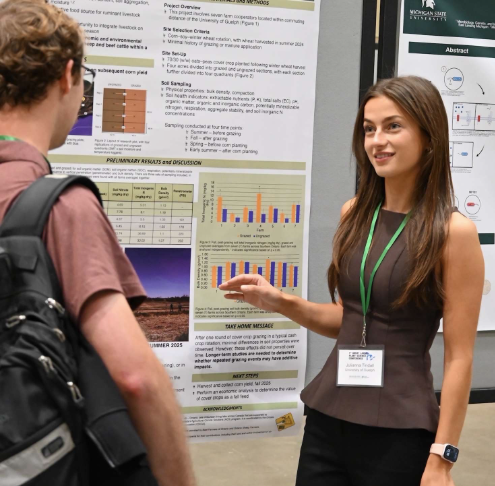Exploring the Agronomy and Economics of Grazing Cover Crops: MSc student Julianna Tindall

Graduate student Julianna Tindall is exploring how cover crop grazing affects soil health, crop yields, and livestock systems. Her cross-disciplinary research in OAC’s Forage and Service Crops lab impacts agronomy, economics, and animal nutrition to provide Ontario farmers with practical insights for sustainable farming.
When Julianna Tindall began her MSc in Plant Agriculture at the University of Guelph’s Ontario Agricultural College (OAC), she knew she wanted to take on a project that went beyond the lab. Under the supervision of Dr. Kim Schneider in the Forage and Service Crops lab, Tindall has found exactly that: research that sits at the intersection of agronomy, soil health, animal nutrition, and agricultural economics, all while engaging directly with farmers in the field.
Her research examines the environmental and economic impacts of grazing cover crops on cropland, an approach that has the potential to rethink how Ontario farmers integrate livestock into cropping systems. Farmers are often concerned that livestock in crop fields can compact soil or reduce crop yields. Tindall’s early findings, however, offer a different perspective.

“Although we are still in the early stages of analysis, our research shows that grazing a simple oats and peas cover crop mix had a neutral effect on soil health after one grazing cycle in Southern Ontario. This suggests that while short-term improvements in soil health aren’t guaranteed, farmers can integrate livestock without worrying about negative effects such as compaction (at least under conditions similar to our study). Longer-term studies will be important to determine if benefits build over time,” Julianna Tindall.
Working with seven farmers across regions from Wellington County, north to Owen Sound, and East to Peterborough, and connecting through the Living Labs network, Tindall is conducting applied research rooted in real-world farm practices. Her trials are integrated into everyday operations, making her findings highly relevant for producers. Sheep and beef farmers are included in the project, expanding its reach across livestock sectors.
For Tindall, this hands-on collaboration is what makes her research most rewarding. “It’s exciting to see results on-farm rather than in an isolated experiment. I get to work alongside farmers and learn from their experiences while contributing data that can inform future sustainability practices,” she says.
Her work is already gaining attention. She recently presented her findings at the Soils For Our Future Conference and the First Great Lakes Plant Science Conference. She also showcased her research at the Canadian Roundtable for Sustainable Beef Annual General Meeting, where McDonald’s Canada sponsored her graduate student presentation. The symposium connects her to beef producers and sustainability experts across Canada, offering a platform to demonstrate how her research supports long-term industry goals.
Advancing her career in agriculture
Tindall’s journey to graduate research has been steady and intentional. After completing her BSc Agricultural Science (majoring in Crop Science) at OAC in June 2024, she worked briefly in industry with Bayer and as a research assistant in the Department of Plant Agriculture. Her return to graduate studies was always part of the plan. “I knew I wanted to pursue grad school, and this project stood out because of the chance to connect research with real farm practices and farmer priorities,” she says.
With her research bridging disciplines and industries, Tindall represents a new generation of agricultural scientists. She sees sustainability not as a single challenge, but as a system-wide opportunity to connect soil, crops, animals, and economics for the benefit of farmers and the food system.
Beyond her research, Tindall is co-chair of the OAC Graduate Student Council (OACGSC), helping build connections and support for fellow graduate students.
“My approach to graduate school has been to embrace every opportunity, get involved early, and make a positive impact,” says Tindall.
In her role in the OACGSC, Tindall works with a team of fellow graduate students to create events that connect students with each other and with the agricultural sector.
“Being co-chair has been incredibly rewarding, and it’s why I recommend OAC to anyone considering pursuing their graduate degree.”